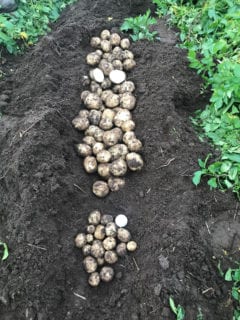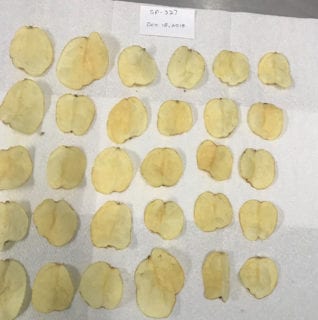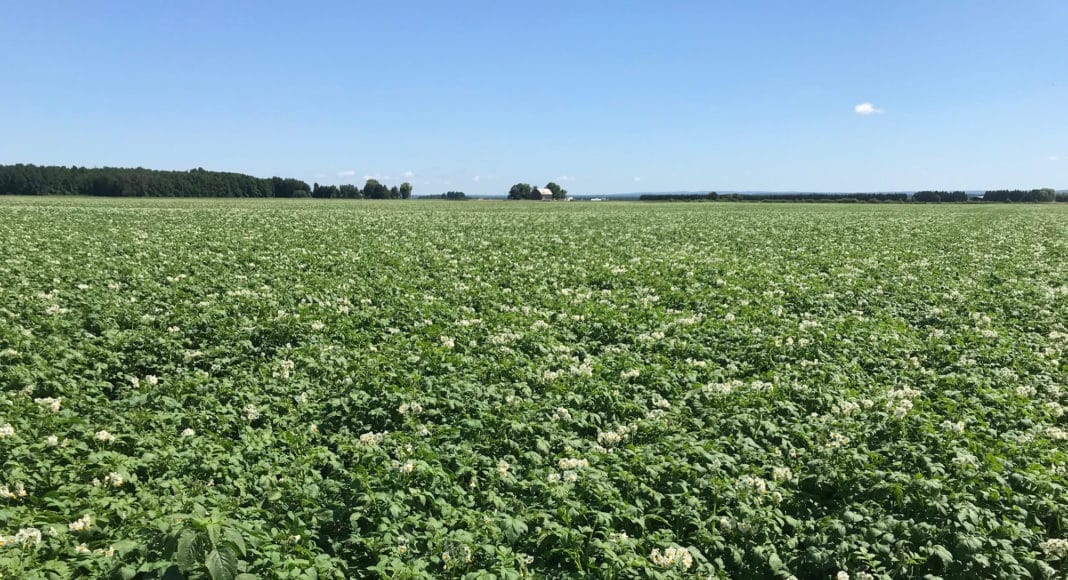SP327 is a new chipping potato variety developed in Ontario by Peter Vander Zaag.
New varieties are crucial to the health and growth of the Ontario potato industry. Plant breeders strive to improve the traits potato processors and buyers want for their markets.
Most of the potato breeding in Canada has been publicly funded by the federal government at the Fredericton Research and Development Centre in New Brunswick, but private breeders are now taking a more active role.
Peter Vander Zaag is known globally as an outstanding potato scientist, educator, mentor of grad students, innovative potato producer and breeder. In 2011, he was instrumental in helping to form the Canadian Private Potato Breeders’ Network, which facilitates collaboration and is a collective voice for independent potato breeders.

Vander Zaag’s breeding work has focused on potato varieties for processing. Worldwide, chip processors are looking for varieties which can be stored for long periods and maintain low levels of reducing sugars during storage. Potatoes stored at 4 C have reduced sprouting, less moisture loss, and less disease incidence. However, they will also convert starch slowly reducing sugars and producing brown, unmarketable chips when fried.
Development of a new chipping variety is a long process, taking more than 10 years. Fortunately, our own Ontario potato breeder, Vander Zaag, has developed a new chipping variety called SP327. SP327 has been grown in Manitoba, Ontario, and Quebec with excellent results — high yields, medium to high dry matter and outstanding chipping quality after long storage. The variety is also being evaluated in China.
On Aug. 26, I visited a non-irrigated field of SP327 near New Lowell with Vander Zaag and his wife Carla, who is also involved in the breeding program. The field was planted on June 2 and it was still vigorous and healthy. I was impressed with the even tuber set, size and high yield potential. There is no doubt SP327 is a variety which should help potato growers to remain competitive.
Mark VanOostrum, field supply manager with WD Potato Ltd. near Beeton, Ont. is also impressed with the plant vigour and yield of SP327 and expects to do some commercial frying this coming winter.
Besides the excellent frying quality, SP327 can also be sold in the fresh market. I have tasted it boiled, and it’s delicious. Although SP327 has white flesh, it tastes like the yellow Yukon Gold.
SP327 was registered in Canada on May 22, 2020 and is being multiplied for sale under a license agreement with La Patate Lac-Saint-Jean (LPLSJ) in Quebec. SP-327 Variety Fact Sheet

Frédéric Tremblay, business development manager for LPLSJ, told me “SP327 is at a high generation stage. We did test digs to check it last week and we saw many potatoes per plant and good yields.”
Vander Zaag has also developed SP326 — another chipping variety with excellent yields and medium to high levels of dry matter. Frying quality is also very good. He has more selections/varieties in the pipeline.
Breeding french fry processing varieties with durable resistance to late blight is an important objective of Peter’s breeding program. He is collaborating with Andre Gagnon (Progest, Quebec), Darin Gibson (Gaia Consulting, Manitoba) and Joyce and Robert Coffin, (Privar Farm, Ontario) in this project.
A Chinese potato variety resistant to late blight has been crossed with Prospect, a french fry variety developed by the Coffins, with the aim of combining the best traits of both potato varieties. Durable resistance combines several sources of resistance in the same variety so that late blight does not overcome the resistance easily. There are seedlings which look promising, but it will take several years to determine if they have the yield and quality needed for a successful processing variety combined with durable late blight resistance.
Vander Zaag is passionate about potato breeding, which requires patience, financial resources, and a lot of work. Even if a potato breeder finds a superior seedling, there are numerous challenges to getting a new variety accepted by processors. Vander Zaag believes local breeding programs will have great impact in their environmental or ecological zones. There is no doubt he is right about that!











